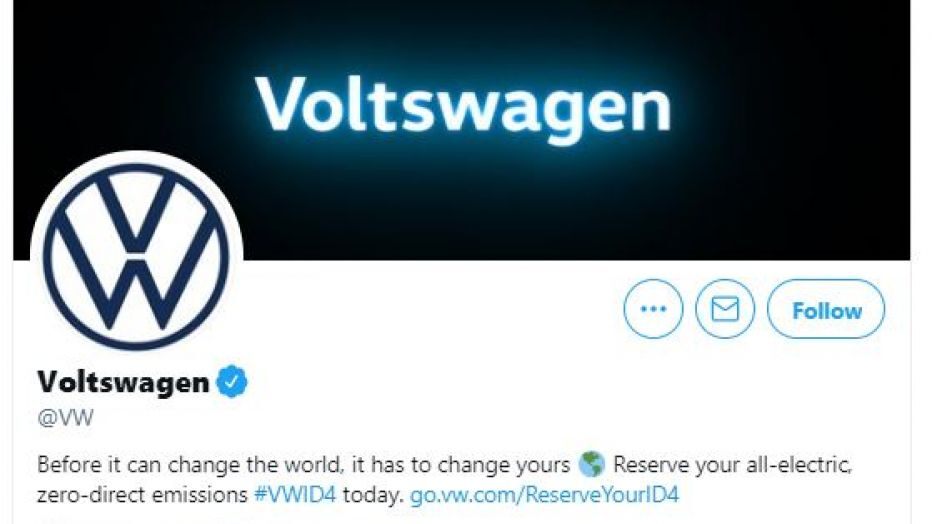“There's no such thing as bad publicity,” the saying, attributed to P. T. Barnum, the 19th-century American showman and circus owner may have once been true. However, Volkswagen of America seems to be putting the theory to the test this week.
On Monday, the US-based subsidiary of Germany’s Volkswagen Group briefly posted an incomplete press release on the company’s website. The release announced plans to rebrand the company to "Voltswagen of America" and add "Voltswagen" badges to its electric vehicles.
On Tuesday, March 30, the company published the completed press release (since removed but available on the Internet Archive), boasting the rebrand "a public declaration of the company's future-forward investment in e-mobility." Even worse, when questioned, additional social media posts suggested the rebrand was not a joke and was a serious effort by the company.
But on Tuesday night, Volkswagen spokesman Mark Gillies confessed “There will be no renaming of Volkswagen of America.” In an email statement, Gillies continued “The alleged renaming was designed to be an announcement in the spirit of April Fools’ Day, highlighting the launch of the all-electric ID.4 SUV and signaling our commitment to bringing electric mobility to all.”
By Wednesday, all of the goodwill generated by the reported green endeavors has withered on the vine. It also left marketing professionals, such as those of us at DesignHammer, bewildered as to the intent of the failed campaign.
Ultimately, the fundamental problem with the campaign was that it just wasn’t funny. How is a promise of increased corporate dedication to environmentally-friendly electric vehicles a joking matter for a company that was hit with over $4 billion in civil and criminal fines by the US Department of Justice for deceiving US environmental regulators by cheating emissions tests in an attempt to sell close to 600,000 vehicles that would have failed to meet emissions standards?
How about for light-hearted, “VW will reintroduce the classic 1967 VW Beetle, with optional “Summer of Love” package that includes rusted through floor pans and quarter panels, a stuck engine cylinder, and leaking head gasket, so new generations can have the authentic 1960s ownership experience?” I have got ideas lots better than the team responsible for the current debacle. Give me a call, Volkswagen, we can do lunch.
Even worse, the source of the trouble seems to have originated with the poor content entry process displayed by Volkswagen’s web staff. Why was an incomplete press release posted to the production website? Why was a press release published that was obviously not ready for public release? The trouble came when the campaign wasn’t released all at once. This problem could have easily been avoided with better process and controls. The stunt still wouldn’t have been funny or effective, but at least it wouldn’t have been a total embarrassment.
What can we learn about how to handle corporate April Fools’ Day from Volkswagen’s disastrous 2021 attempt?
- Don’t jump the gun: Publish on and with an April 1st dateline. Most everyone has come to question any article posted on April Fools’ Day. Also, don’t post incomplete articles to your public web server for just this reason.
-
Make it funny and subtle, but obvious: First and foremost make it funny! Just being not true isn’t at the heart of an effective April Fools’ Day prank. It should be ridiculous at face value but at the same time be just barely believable. While it doesn’t take much, throw something in, be it the date line location, name or title of the person providing quotes, etc. that give it away as farce. The most effective April Fool’s Day posts are often those the reader will read multiple times and notice on a second reading the farce that gives it away. -
Come clean if questioned: If you fail at steps 1 and 2 and face questions on the veracity of your press release by the media, don’t lie and claim it’s true! All you do is lose credibility with the press for little to no gain. -
Have a good publishing process: While not restricted to April Fool’s Day, make sure you have a good publication process to ensure content is not published prematurely. -
Always ask “is this a good idea?” When in doubt, leave it out.
It is tougher and tougher in today’s business culture, particularly for publicly traded companies, to get away with April Fool’s Day pranks. Be careful if you do, and try not to be the next Volkswagen.



Add new comment